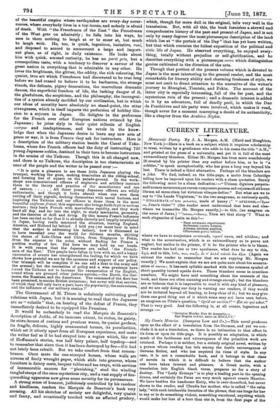CURRENT LITERATURE.
Macaronic Poetry. By J. A. Morgan, A.M. (Hurd and Houghton, New York.)—Here is a book on a subject which it requires scholarship to treat, written by a gentleman who adds to his name the title " A.M.," and printed at the press of a university, and yet it is full of the most extraordinary blunders. Either Mr. Morgan has been more scandalously ill-treated by his printer than any author before him, or he is "a cobbler," to speak metaphorically, who has gone a long way beyond his last. There is indeed a third alternative. Perhaps all the blunders are a joke. We find, indeed, on the title-page, a motto from Coleridge telling how he imposed upon his readers with a sham quotation. Surely the following must be a sham dedication :—" Utinam digniora perpetu- andi nomen memoramque caram componere possem sed cujnsmodi sit hullo librura ad memoriam tui virtutem vitaque dedico." But what are we to say to "De Laude Virgininra," to the two anagrams, so curiously spoilt, " 11TOAEMATI,-=Avo 140.4e,roc, made of honey ;" "
on., Juno's violet"? (the reader must understand that here and else- where we transcribe Mr. Morgan exactly,)—to this, (an anagram on the name of Jesus,) ""boroes,—zems, Thou art that sheep "? What to such elegancies of Latin as this?—
" Nam scratanto reperiunam Saltentem contra Lunam, Alterran nitidam puellam Offerentem porco selletn," where we have to conjecture scrutando, reperi unam, and nitidam; and what to the accentuation, which is so extraordinary as to prove not neglect, but malice in the printer, if it be the printer who is to blame. The reader has had one or two specimens, what does he say to this, and to this, Foga, Trys, waiZE, ToimoD Owe ti;;■a. (Again we entreat the reader to remember that we are copying Mr. Morgan exactly.) We must explain that we are not quite sure about his accentu- ation of •reerco ; it has each syllable marked with the common symbol of short quantity turned upside down. These blunders occur in countless. numbers. We might have said something about the contents of the book, and these are often amusing and strange enough ; but the blunders. are so hideous that it is impossible to read it with any kind of pleasure, and we are only doing our duty in warning our readers, if they would not be irritated beyond all bearing, to keep clear of it ; but we may give them one good thing out of it which some may not have seen before, an anagram on Pilate's question, " Quid est veritas?" Est vir qui adest." That is very good. And the following is, at all events, ingenious and
strange :—
“Georeius Monke, Dux de Aumerle,—
Ego itegem reauxi, snub as AIDOLVV."


































 Previous page
Previous page